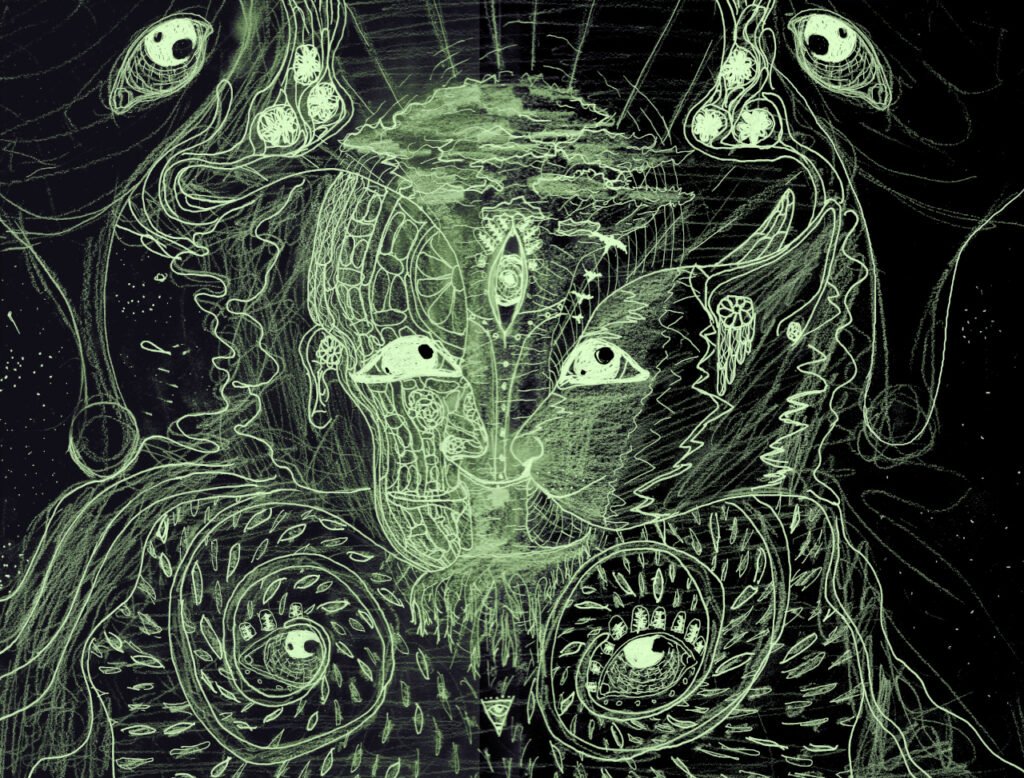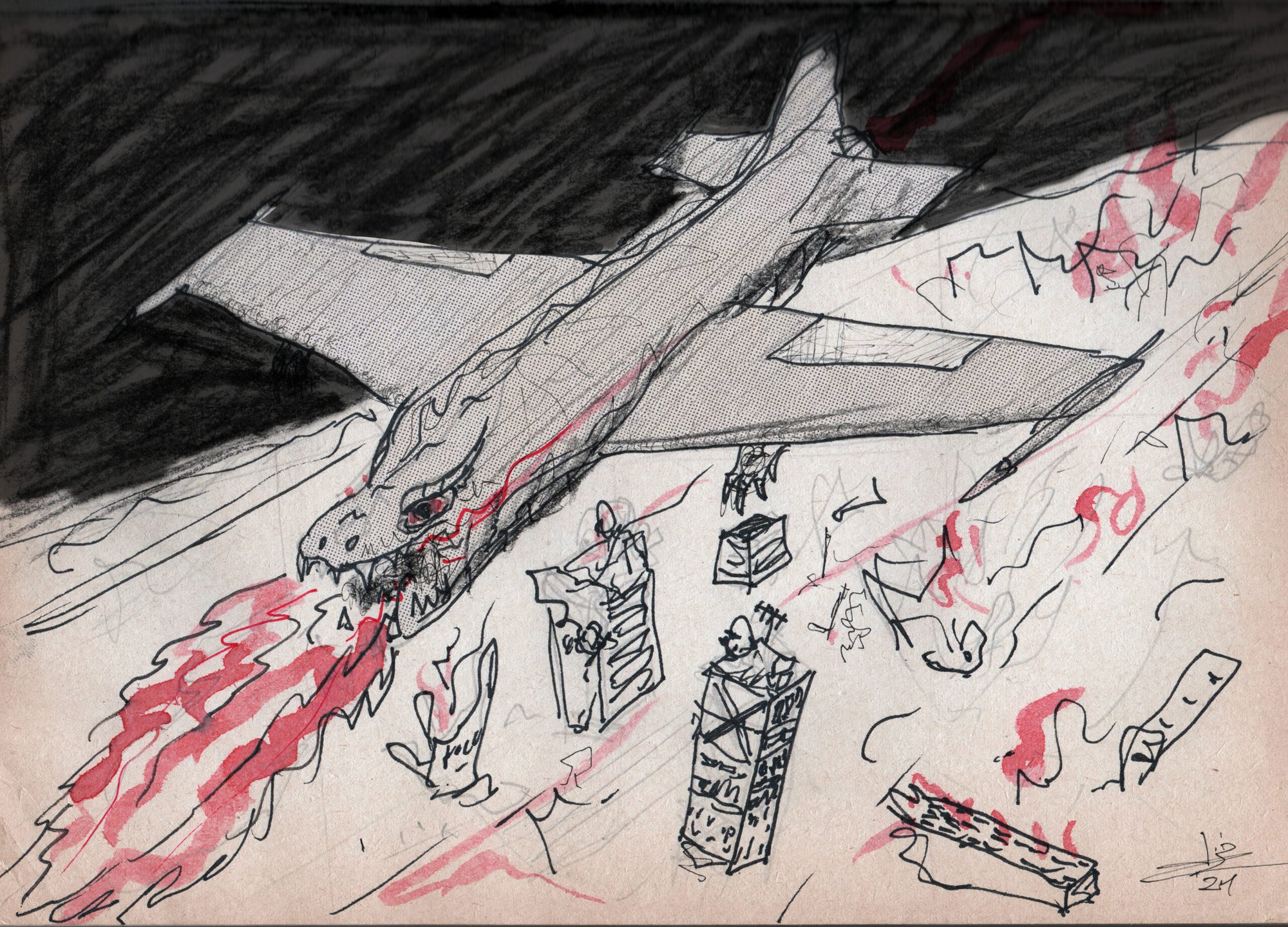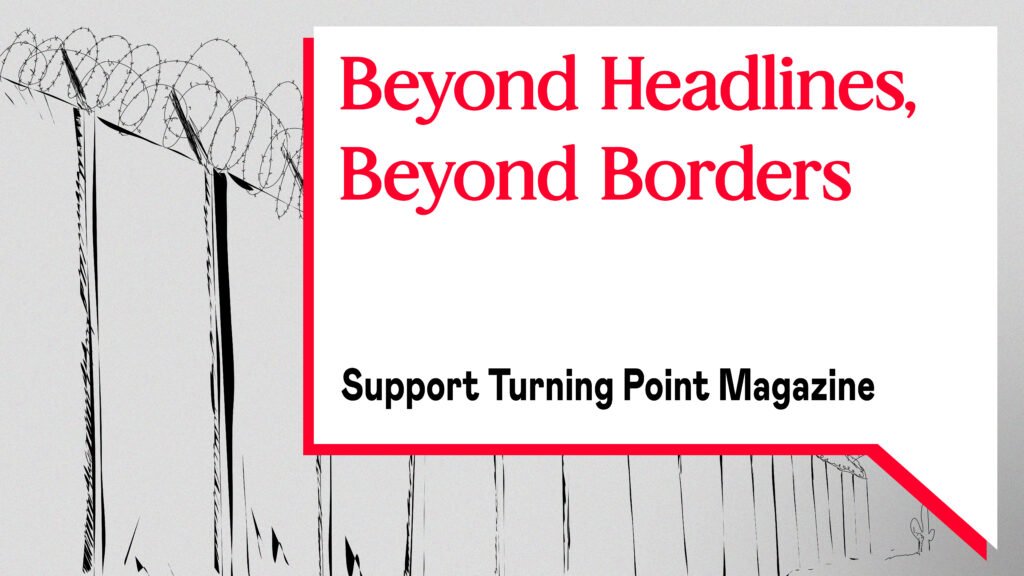Cover photo: Fire Breathing “Dragons” Terrorizing the Sky, 2024. An artwork depicting Israeli airplanes bombing southern Lebanon in 1996. ©Nizar Al Rifai
I have lived under the shadows of two occupations, as my homelands in Ukraine and Lebanon face the same monster of unchecked nationalism and imperialism.
Growing up in a Hezbollah-dominated part of the country wasn’t always easy. My father is Lebanese, my mother is Ukrainian. Born in Ukraine during the last days of the Soviet empire, I moved with my family to Lebanon after the civil war came to its ambiguous end via “Pax-Syriana.” But the truth is, Lebanon’s low-intensity conflict continued and larger countries never stopped playing with us as pawns. Growing up largely in Baalbeck, a mixed town with a growing majority Shia population—who form also a cornerstone of Hezbollah’s popular base—I hold unique insight into how the group came to prominence in the 1990s and afterward. I experienced the atrocities of the Israeli military and I saw Hezbollah turn its guns on other Lebanese and our Syrian neighbors.
For many of us, the war that ripped the country to shreds through the 1970s and 80s ended in 1990. For Lebanon’s southern, largely Shia, communities, it dragged on for another decade via Israel’s brutal occupation of the south. While many of us only experienced the full horror of war through cautionary tales from parents, relatives, and friends, Lebanese Shia were being bombed and kidnapped. Israel maintained a notorious torture facility in the occupied zone until 2000, run in collaboration with a Lebanese proxy government. It is this experience of trauma, rather than strictly religious dogma, that led to Hezbollah’s rise.
Dragon’s Breath
One evening in 1996, my younger brother and I were watching the movie Predator (1987) for the first time on Lebanese TV. We were very happy because our parents would probably not have let us watch such a violent movie, but our grandmother didn’t mind. After watching way too many advertisements over the first five minutes, we finally arrived in the film’s luscious jungle background only to be interrupted by loud repeating explosions that unfortunately weren’t coming from the TV. At first, we only saw orange glowing flashes in the distance; then tracer fire, the sound of fighter jets, and explosions—suddenly the whole city went dark. The Predator was over. We slept on the balcony that night for some reason and our grandmother told us fables. The next day we somehow got electricity and the news showed us images of the Israeli jets with shark teeth decals being rearmed on an airbase. My grandmother sometimes struggled to understand modern technology, but she shared with us her interpretation of modern jet warfare: “this is what attacked us, it opens its mouth and launches fireballs.” My brother was terrified.
My immediate family isn’t Shia but we have extended family in the community and we shared the trauma of living with our neighbors in an area dramatically affected by Israel’s occupation further south. For an average Palestinian or Lebanese person, their only experience of Jewish people is of the Israeli military bombing them. As someone with another nationality, who could travel back and forth, I was privileged enough to meet Jewish people in totally normal circumstances, and this helps me see Netanyahu for what he is, another sectarian warlord with an undeclared nuclear arsenal. I am proud that Ukraine is a country with a Jewish President and Muslim Defense Minister. To quote the Syrian independence figure Sultan al-Atrash, “religion is for god, homeland is for everybody.” I think the values Zelensky brings to his position speak for themselves—in Netanyahu I see another brutal sectarian warlord, that has degraded an entire region.
For Lebanon’s other sects, who have historically marginalized the Shia community, the war was over in the 1990s; even though Israel continued targeting the Shia and occupying the south. Enormous massacres by the Israeli army, including the 1996 shelling of the UNIFIL compound in Qana, which killed 106, including 4 UNIFIL peacekeepers, were ignored by the international community and Lebanon’s monied class, which was riding high on foreign investment in the wake of the war.
Lebanon’s reputation as the Paris or Switzerland of the Middle East in the 1950s and 60s was largely built on post-independence exploitation of Lebanon’s poor, marginalized, and emigrant communities—bolstered by the nation’s deregulated labor laws for immigrant workers. In many cases, the most marginalized were the Muslim communities, especially the Shia, who were under-represented in Lebanon’s democracy: a system tainted by the colonial-inspired sectarian political system.
Identity and the Paths of Life
Identity is like an ever-evolving autoportrait, a sketch you draw layer over layer. Understanding oneself is not always easy, and as such identity is never a static thing. Growing up Lebanese/Ukrainian this “sketch” would be supplemented with many things. In a sense “we all live in America.” American culture has probably touched and influenced almost everyone on this planet one way or the other. You are the languages you speak, you are the food you eat, you are the people you meet and spend time with. Identity is not a static singular monolith, it’s a dynamic ever changing painting.
After graduating from college in Lebanon I worked in the marketing/advertisement sector. It was fun and promising, but my heart was always somewhere else. At the time, the Arab Spring was in its early more hopeful days, and the revolution in Syria was inspiring real hope—it radiated like a beacon of pride in those early peaceful months. As the murderous regime in Damascus slowly imprisoned, killed, broke, or exiled those standing up against it, what little pressure we could apply, now seemed lost and futile against a horrible fascist murder machine. It was time to move on for the time being and regroup.

I moved back to Ukraine in late 2012. It was “the year the world will end”, and from the experience in Lebanon and what was happening in Syria, at times it sure felt like that.
I even recall the exact moment I decided to order a ticket and head back to Kyiv, something of a personal omen when a flock of birds flew above me.
In Ukraine I tried applying myself in different ways, I got heavily involved in science and technological startups. My Ukrainian family are scientists and inventors, and even my friends and their families also came from this hyper-talented creative environment. I spent months and years helping develop and propagate renewable energy innovations, technologies for processing waste in new innovative ways, and many other inventions and solutions that I truly believed would change the world for the better. However, the harsh realities in Ukraine didn’t match up with my expectations. The corruption that many of these types of startups faced under Yanukovych’s government, with its hands in all the institutes, stood in the way of any real development. Where corruption was always a serious issue, under the Yanukovych regime it skyrocketed to obscene heights.
The Revolution of Dignity, which hit the streets of Ukraine in 2014, was something truly inspirational. The fall of Yanukovych’s Russian-backed regime was Ukraine’s recommitment to freedom and democracy. Across the border, Vladimir Putin set out to strangle us in our infancy. Russian forces blatantly invaded Crimea and parts of Donetsk and Luhansk while lying to the entire world. Once more I had to contend with living in a country that was partially occupied.
In 2022, my experience as a Ukrainian came to mirror my Lebanese experience even more closely. More tracer fire and explosions out the window, more images of foreigners coming out of armored vehicles marked with big “V’s”’” on them, more nationalist lies from their leaders. Unlike with Lebanon, the world banded together to protect Ukraine, and the explosions I hear now, from what I can tell, are mostly from the missile interceptions made possibly by Western defense systems. Yet, Russia continues to kill us in countless ways. Meanwhile, in Lebanon, the bombs continue to wipe out neighborhoods and villages without consequences.
My Grandmother Taught Us to Fight Empires
The generational trauma in my family is always tied to the misfortune of being born in the shadow of empires. My great-grandfather was a farmer from Poltava, my other great-grandfather was a religious scholar from Baalbek. My great-grandmother was a survivor of the Holodomor famine who passed down the need to fight empires, my other great-grandmother was from Homs, and she also taught us to fight empires.
I was blessed to grow up with a Syrian grandmother who had a warm heart and an unending sense of humor even in the darkest times. Yet, even with all the wisdom of her age, her worldview was very archaic, bordering on the whimsical. She grew up during the time of the liberation of Syria from the French and had no education as she was married off at a very young age. Even without the benefit of education, to her, the struggle against the Israeli occupation was not a struggle against the Jewish people—she frequently reminisced about how nice her Jewish neighbors in Baalbek and Homs had been. People who are unfamiliar with Lebanon would be surprised by how much the struggle for Palestinian statehood is still naturally seen as a struggle against settler colonialism and not a conflict against Jews.
My hometown Baalbeck, a mixed town with a growing majority Shia population, is the cornerstone of Hezbollah’s popular base. Hezbollah, unlike some of the extremist groups the US has engaged with, was very sophisticated in their recruitment, which relied on cheap propaganda disks and “Moqawama” mods for Counter-Strike and other popular video games. Though religious dogma and sectarian agendas are a huge part of Hezbollah’s ideology, its existence is a far cry from the Al-Qaeda camps in Afghanistan.
The organization would eventually evolve into having its own independently-run education system where extracurricular activities, such as scouts, often intersected with Hezbollah’s doctrines.
Hezbollah gained popularity by largely focusing on the occupation of southern Lebanon and largely staying out of Lebanese electoral politics. In the organization’s later phases, it brought military discipline to its political proxies. They also used a lot of brown-shirt fascist “street thug” tactics. When they wanted to intimidate, they would send out large groups of men. As the political divide widened, they turned to outright violence against other Lebanese groups, culminating in a 2008 effort to violently seize part of the capital. In the decades since the occupation of south Lebanon ended, the group expanded its focus.
Between the tyrannical Syrian occupation, the sporadic Israeli airstrikes that would escalate to full-scale war, and Hezbollah’s cynical recruitment of my neighbors with empty promises of revenge or the liberation of Palestine, life continued. Even though we lived in a city where most people made their living with small-time shops and trade, the majority of the Bekaa, as well as a large portion of the rest of Lebanon, is tied to agriculture: from fruits and vegetables to the narcotic Hashish and grapes for renowned wine cultivation in the red soil of the large valley. We have no oil, we have no booming tech sector, we have nothing to offer our myriad colonial masters, Yet, they cannot help playing with us as if their empires depended on it.
When people say Hezbollah “strongholds”, I find this to be an extreme exaggeration. The only real “stronghold” was Hezbollah’s little security square inside Dahiyeh, the same location that Israel destroyed when it assassinated Hasan Nasrallah, Hezbollah’s Secretary General. Hezbollah’s areas would always have a strong or, at the very least visible, presence. But it was never complete domination. These areas always had mixed populations living in them, even though the Shia demographic would be the majority. With time Hezbollah’s network expanded to civic and social structures—the Hezbollah-administered hospitals, often with funding from Iran, would become the largest healthcare providers in many areas. People who did not belong to Hezbollah or believe in the group’s ideology would end up working in their hospitals, schools, and other facilities. Sometimes working for the local Hezbollah hospital was the only way you could find work and stay in the town or city you were born in.
I believe Hezbollah’s leaders and fighters should face consequences for their actions in Syria. But killing doctors and civic workers who had the misfortune of being born in a lawless land alongside Hezbollah fighters is not justice. Legal accountability is the only way forward and will be a painstaking process, healing the wounds will be a generational process that some of us may not live to see.
A lot of the people involved in Hezbollah’s civic and social arms are not pro-Hezbollah and don’t have to be Shia Muslim. There are a lot of folks who are vehemently against Hezbollah’s actions in Syria and Lebanon and Lebanese politics, but they do not have a real alternative, apart from moving, if they want to live in their villages and towns.
After the Syrian revolution turned into a war, it would often spill into Lebanon and the Bekaa specifically. Quite frequently, that “spillage” would be in the form of combat and violence. Many of the smuggling networks that had worked with Hezbollah started smuggling for the Free Syrian Army. During those years, I avoided a kidnapping attempt while working on a story about Syria’s Zabadeneh.
My family, like many Lebanese, has deep roots and branches in Syria, my Grandma’s family is from Homs. The Syrian civil war was painful for Lebanese families, whose relatives lived in Syria. During the war, my relatives were being killed by Hezbollah’s allies as I lived in relative comfort in Beirut and Baalbek. I’ve heard of instances where people of the same family ended up killing relatives and kin in Syria on behalf of Hezbollah. The way this impacted society and the closely-knit relationships of Arab families was truly painful.
Syria’s occupation of Lebanon was very brutal, and in many forms represented what I believe true terror meant. Syrian secret services scared all layers of society into complacency, from the ruling elites, down to the working class. Lebanon’s Shia population also knew how brutal and ruthless the Ba’athist regime was. Despite all this, Hezbollah chose to ally itself with this same regime and slowly became something resembling the Assad dictatorship.
In many ways, Hezbollah has become the same monster it started off fighting—now becoming complicit in the mass slaughter of Syrian people. This more than anything else, is what left Hezbollah vulnerable, and without many friends. Hezbollah’s advantage has always been that its backers in Tehran are more committed to financing the organization than the rest of the world is to building a truly non-sectarian Lebanese state.
Holocaust denial is endemic in the Arab world, and Hezbollah has disgracefully embraced holocaust denial exhibitions. Very notably, in 2001, the Lebanese government banned a holocaust denial event from taking place. It would be naive to say the scourge of holocaust denial isn’t present in Lebanon, but unlike in the dictatorships in the region, there is a serious pushback from intellectuals and public figures who carry weight. Unlike in Saddam’s Iraq or Assad’s Syria, in Lebanon, we are allowed to freely express disgust for stupid ideas.
Lebanon should be, and in many ways is, a progressive bastion in the Middle East, with relative freedom of speech, genuine political and religious diversity, and long-standing discussions of feminist ideas. The nation was also a refuge for dissenters from many schools of thought, from many nations. The only way forward, for Lebanon, and everyone in the region, is a full withdrawal of occupation forces, and an enforceable ceasefire. Hezbollah flourished due to the weakness of the Lebanese state, and most Lebanese are looking for a peaceful solution to the conflict.
The Lebanese civil war involved many powerful groups, some numbering in the tens of thousands of fighters, with large swathes of Lebanese territory seemingly under their control. Yet when the outside funding for many of these groups dried up, their strength and presence were diminished to only a shadow of what it once was. Hezbollah was born from the same civil war, and in many ways, once the external funding for the group is cut, it will also slowly wither and become a less dominating force on the ground and in Lebanese politics.
Lebanon needs real statehood, based on an international effort to manage resources to help protect a stable and democratic future, instead of devoting so much energy to making sure we are easier to invade, or using us as a proxy to exert pressure on others.
People living in rich and powerful nations often see conflicts in far-flung regions of their empires as the result of exotic blood feuds, intolerance, or a refusal to accept modern sensibilities. But for occupied people, the reality is much simpler. As a Ukrainian, Lebanese, and human, it boils down to the simple fact that we will not be colonial subjects of any empire: many have tried, all will fail.
Nizar Al Rifai
Nizar Al Rifai is a Ukrainian-Lebanese artist, researcher, and inventor who worked on projects such as the Onipko Rotor. His creative works include a series of artworks and articles documenting the impact of Russia’s attempted full-scale invasion of Ukraine on day-to-day life, partially published by The New Humanitarian.




